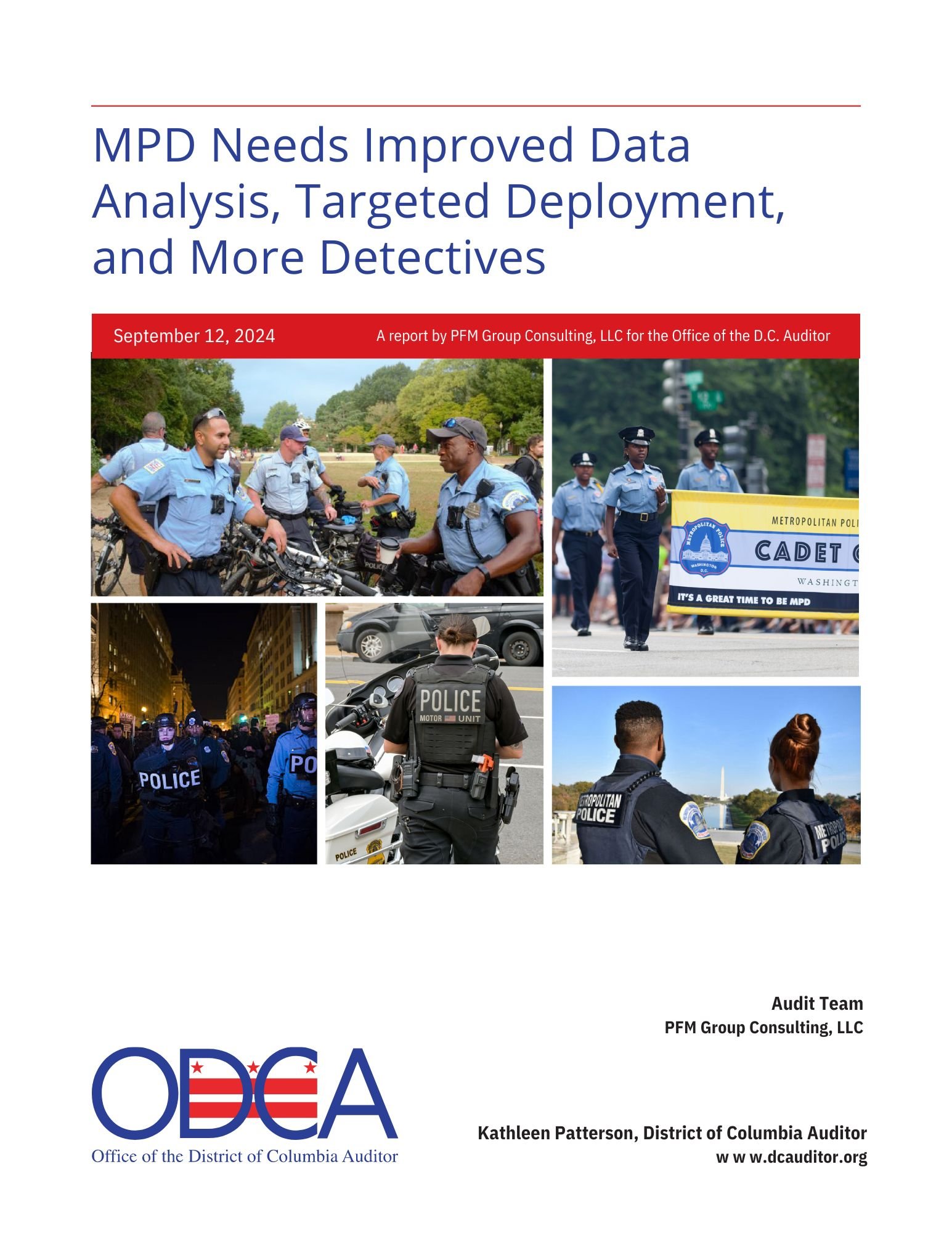By Kathleen Patterson, District of Columbia Auditor and PFM Group Consulting
Over 18 months, PFM collected the most reliable data available to form its conclusions. This involved benchmarking reported crime, levels and types of agency staffing, specialized functions, and unique responsibilities with six other police agencies. The PFM team also engaged with MPD and Department of Forensics Sciences (DFS) personnel, conducted numerous interviews, and led group discussions throughout MPD to ensure a comprehensive understanding of MPD operations. The PFM team included experts in police staffing and organization with substantial experience working with other departments to develop workforce strategies, improve operations and increase department efficiencies. To review the findings, please consider the context of MPD’s staffing as of October 1, 2023. At that time, MPD had 4,000 filled and vacant sworn positions. Of these: 47.3% (2,257) of the positions were allocated to Patrol Services (PS). 11.5% (547) of the positions were allocated to the Investigations Services Bureau (ISB). The remaining 41.2% (1,196) positions were allocated to other, primarily support, sections of the Department, including Professional Development (652), Homeland Security (244), Executive Office of the Chief (60), Technical and Analytical Services (19), Youth and Family Engagement (161), and Internal Affairs (60). The study’s primary focus was on patrol services and investigations, the backbone of MPD’s operations and crucial to every community. Other sections of the Department were examined primarily for the impact of their work on PS and ISB. We found that MPD data were insufficient for a robust analysis of current and historical staffing levels by bureau, division, rank, and positions. The Study concluded that the department’s Patrol Services is adequately staffed at its current level of 1,340 officers. However, it also identified ways in which patrol personnel’s current placement and shift assignments do not align with the study’s workload-based staffing model. Additionally, the study found a shortage of 65 Investigators (primarily District Detectives) based on the workload of the Investigations Bureau. Patrol Services and Investigation Services Bureau staffing and personnel placement recommendations used PFM’s workload-based staffing model, which is based on analytical methods and peer-reviewed research developed for the U.S. Department of Justice. Additional findings include: MPD urgently needs to gather more comprehensive data on how PS and ISB personnel spend their time. Better understanding time consumed by activities such as guarding arrestees and prisoners at hospitals, performing homeland security-related duties, and engaging in various proactive policing activities could significantly improve future staffing needs assessments. MPD’s proportion of professional (non-sworn) personnel is less than that of the benchmarked agencies and comparably sized agencies tracked in the FBI data tables. Better success with civilianization could free sworn personnel to do more work that explicitly requires their skills. The Department’s time and attendance system needs improved functionality to collect, monitor, and report comprehensive information to track and analyze overtime use. This information impacts the agency’s ability to make timely and thoughtful staffing decisions. MPD’s use of officers from patrol and non-patrol assignments to fulfill special details, such as large scale events and the movement of dignitaries, impedes these personnel’s ability to do their primary jobs and merits a data-based analysis of long-term Homeland Security Bureau staffing needs. A key conclusion is that staffing decisions will inevitably change as work requirements tied to Department goals and community expectations evolve. This dynamic nature of staffing decisions underscores the need for adaptability and flexibility. In responding to the draft report MPD states that in the last five years use of overtime indicated the need for “500 or more officers to meet community needs” but included no data to support that assertion. This underscores the need for accurate and comprehensive data collection to inform future studies and to more critically assess staffing adequacy, policing effectiveness, and community satisfaction. As a result, workload-based data should be regularly reviewed and incorporated into short-, medium-, and long-term strategies and staffing plans
Washington, DC:Office of the District of Columbia Auditor , 2024. 459p.


